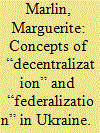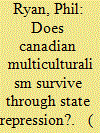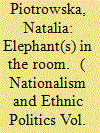|
|
|
Sort Order |
|
|
|
Items / Page
|
|
|
|
|
|
|
| Srl | Item |
| 1 |
ID:
148118


|
|
|
|
|
| Summary/Abstract |
While the implementation of decentralization in Ukraine holds promise for improving the weak state of consociationalism there, the framing of the issue along regionally distinct lines persists. After a discussion of how preferences for “decentralization” over “federalization” have been inspired in Ukraine, the article evaluates the significance of these terms beyond sociopolitical stratification, that is, their relevance for constitutional reform of unitary states. Belgium and Spain, two countries that transitioned from unitary states to federal and decentralized systems (respectively) are viewed as instructive cases here. Overall, it is found that either approach abets successful devolutionary federalism if accompanied by ongoing, underlying measures to improve consociationalism.
|
|
|
|
|
|
|
|
|
|
|
|
|
|
|
|
| 2 |
ID:
148121


|
|
|
|
|
| Summary/Abstract |
Emma Ambrose and Cas Mudde argued in this journal that the absence of far-right parties in Canada can be attributed, among other factors, to “strong state repression of dissent” on multiculturalism policy. This article provides numerous examples of such dissent, to show that the state repression invoked by Ambrose and Mudde does not exist. The article also argues that certain “supply-side” explanations for the absence of a strong far-right apply to the Canadian case. It notes, in particular, how Steven Harper's Conservative government occupied much of the political space that might otherwise have been available for far-right challengers.
|
|
|
|
|
|
|
|
|
|
|
|
|
|
|
|
| 3 |
ID:
148119


|
|
|
|
|
| Summary/Abstract |
What impact does violence have on ethnic identity? Do acts of violence tend to create greater segmentation and “hardening” of identities among ethnic groups? In this article, we empirically assess the claim that violence inevitably leads to the hardening of ethnic identity (which we operationalize as expressions of ethnic particularism over a national identity). Using survey data from Kenya covering the period 2005–2008, integrated with geocoded data on conflict events in Kenya during that period, and employing multilevel logistic regression analysis, we do not find support for the contention that ethnic identity hardens inevitably as the result of violence. Rather, our findings suggest support for a more nuanced view of the effects of violence on ethnic identity.
|
|
|
|
|
|
|
|
|
|
|
|
|
|
|
|
| 4 |
ID:
148123


|
|
|
| 5 |
ID:
148120


|
|
|
|
|
| Summary/Abstract |
The negotiations that led to the formation of the Irish Free State in 1921 form the focus of this article. A longstanding interpretation of these negotiations has the British finessing the Irish by playing on the weaknesses of character of the Irish delegation. This interpretation is both flawed and influential. On one level, the article questions its historical accuracy and proposes an alternative. On another level, the article seeks to account for its enduring importance. This interpretation plays a role in a larger narrative of Anglo-Irish relations that is rooted in British colonialism and Irish nationalism.
|
|
|
|
|
|
|
|
|
|
|
|
|
|
|
|
| 6 |
ID:
148122


|
|
|
|
|
| Summary/Abstract |
In a very respectful response—titled with a classic rhetorical question: “Does Canadian Multiculturalism Survive through State Repression?”—Phil Ryan supports most of the arguments that Emma Ambrose and I laid out in our article “Canadian Multiculturalism and the Absence of the Far Right.” However, he does question two particular claims: (1) that the Canadian state represses critique of multiculturalism and (2) that there are no other supply-side factors to explain the absence of the far right in Canada. In this short response, I will argue, first and foremost, that Ryan perceives Canada too much through an exclusively Canadian lens, exaggerating the tolerance of the Canadian state for far-right discourse as well as the criticism of multiculturalism by the Conservative Party of Canada.
|
|
|
|
|
|
|
|
|
|
|
|
|
|
|
|
| 7 |
ID:
148117


|
|
|
|
|
| Summary/Abstract |
Using data from 16 countries and employing multilevel analysis that encompasses the national, regional, and individual levels, we find that both economic and social factors trigger anti-immigrant attitudes among Europeans. Regional per capita GDP is positively correlated with tolerant attitudes while the regional unemployment rate drives prejudice. We find a moderating relationship between immigrant population size and per capita GDP, which suggests that, as the size of the immigrant population increases, prejudice rises but only in poorer regions. In more affluent regions, an increase in the immigrant population corresponds to increased tolerance.
|
|
|
|
|
|
|
|
|
|
|
|
|
|
|
|
|
|
|
|
|